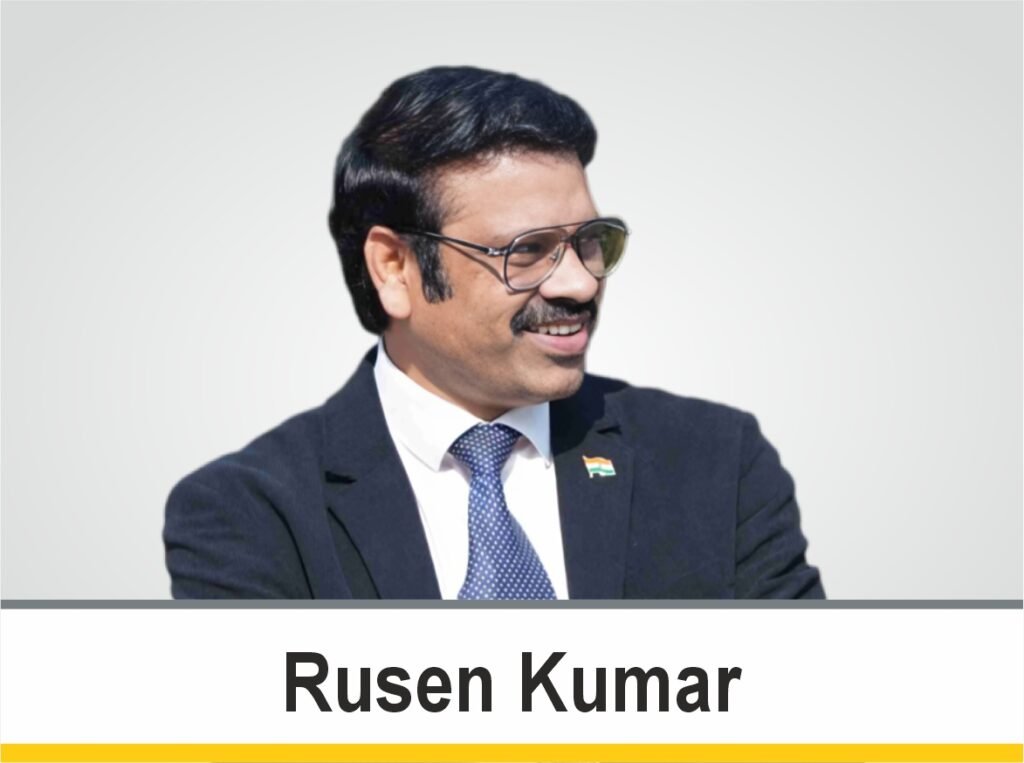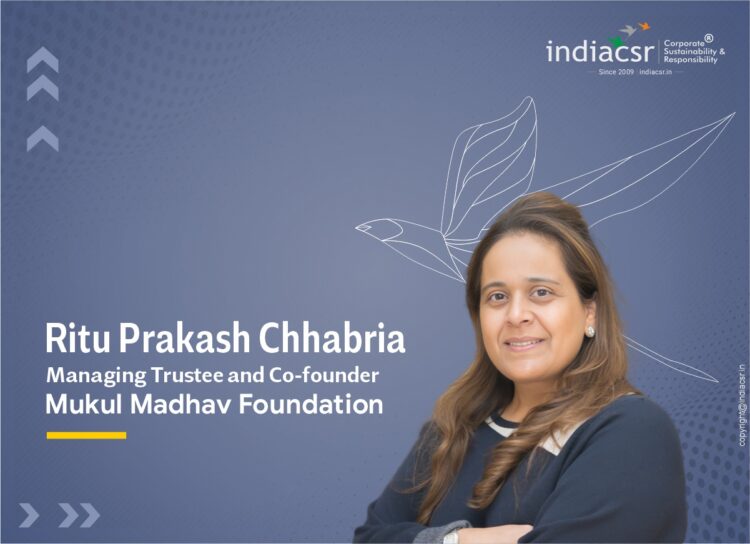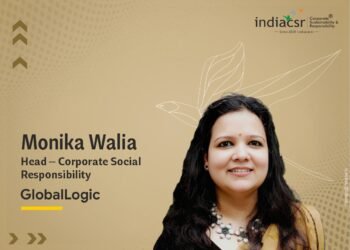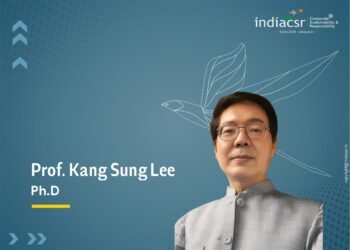
By Rusen Kumar
NEW DELHI (India CSR): In this exclusive interview, Rusen Kumar, Managing Editor & Founder of India CSR, engages in a thought-provoking conversation with Ritu Prakash Chhabria, Managing Trustee and Co-founder of the Mukul Madhav Foundation (MMF), exploring the inspiring journey of the Give With Dignity™ initiative and its evolution from an emergency relief response to a nationwide model of compassionate, sustainable giving. What began in 2020 during the pandemic as an act of solidarity with frontline workers, daily wage earners, and small businesses has now grown into a transformative movement rooted in empathy, inclusion, and community empowerment. Under Ritu’s visionary leadership, Give With Dignity™ has redefined the meaning of CSR and humanitarian aid by introducing the “Buy Local, Give Local” philosophy — an approach that simultaneously supports vulnerable families while strengthening livelihoods of women artisans, differently-abled entrepreneurs, and self-help groups across 24 states. With over 120 SHGs empowered, MSMEs revived, and corporates collaborating under a unified purpose, MMF’s efforts reflect how dignity, not charity, can be the foundation of sustainable social impact. Through its commitment to cultural sensitivity, circular giving, and women-led empowerment, the Mukul Madhav Foundation continues to inspire a new generation of purpose-driven CSR that builds both resilience and respect across India.
1. Could you elaborate on the initial challenges faced when transitioning from an emergency relief effort to a more structured, dignity-focused model?
Give With Dignity™ began in 2020 as an emergency response during the pandemic, when frontline workers, daily wage earners, and migrant communities were struggling to survive, and countless small businesses were on the verge of shutting down. From day one, our intention was not just to offer temporary relief but to uplift everyone along with us. While the initiative provided essential items to help families celebrate Diwali with dignity, it also supported local self-help groups that had lost their income overnight by procuring directly from them. The idea was never to rebuild but to build thoughtfully from the very beginning, keeping dignity, empathy, and revival at the core. What started as a response to crisis soon became a reflection of shared humanity — reminding us that giving, when rooted in respect, transforms both giver and receiver.
2. The “Buy Local, Give Local” philosophy is central to the initiative. How has this approach specifically empowered local MSMEs and self-help groups, and are there any notable success stories you can share?
The Buy Local, Give Local philosophy was born from the belief that kindness can strengthen livelihoods. Every product in the Give With Dignity™ kits is sourced from local MSMEs, self-help groups, and women-led enterprises, empowering over 120 SHGs across the country. 30 of these groups were supported in registering as MSMEs, helping them advance in their business journey. This model ensured that while communities in need received thoughtfully curated kits, small producers found renewed purpose and stability. Women artisans in Maharashtra and Gujarat crafted eco-friendly bags and soaps, while SHGs in Assam and Odisha produced garments and candles — each item carrying a story of resilience and craftsmanship. The philosophy turned aid into a circular act of empathy, where every contribution strengthened local hands, sustained livelihoods, and reinforced community pride.
3. Given the widespread reach across 24 states and diverse beneficiary groups, what strategies has the Mukul Madhav Foundation employed to ensure the quality and cultural appropriateness of the dignity kits in different regions?
Operating across 24 states has deepened our understanding of India’s diversity and the importance of giving with cultural sensitivity. Every region we serve has its own traditions, preferences, and needs, and our responsibility has always been to honour that uniqueness. We work closely with local NGOs and administrations to curate dignity kits that feel familiar and respectful — from food and personal care items suited to local climates to culturally rooted essentials that reflect regional identities. Our guiding thought has always been simple: when we present these kits, we do so with respect, not as charity but as a gesture of shared dignity. We ensure that each kit we share is a testament to the value and respect we hold for the communities
4. How does MMF measure the long-term impact of “Give with Dignity™” beyond the immediate distribution of kits, particularly in terms of sustainable livelihoods and community upliftment?
For us, the true measure of success lies in how lives are strengthened, not just how many kits are distributed. Over the years, Give With Dignity™ has evolved from distribution to empowerment, enabling livelihood opportunities, supporting self-help groups, and encouraging micro-entrepreneurship. Many communities that once received support now contribute back to others. Women have taken up leadership roles, small enterprises have grown stronger, and a spirit of self-reliance has taken root. The ripple effect may not always be quantifiable, but it is deeply visible — in confidence, collaboration, and compassion that continue to grow long after the initial act of giving.
5. In what ways does this initiative serve as a blueprint for other corporations looking to move beyond “box-ticking exercises” in their ESG and CSR efforts?
Give With Dignity™ shows how CSR can move beyond symbolic giving to become a living example of shared purpose. During the peak of the pandemic, Mukul Madhav Foundation received generous support from over 40 MNCs and corporates who came together to stand united for humanity. This collaboration demonstrated how empathy can drive collective action. Through our partnership with Finolex Industries, we’ve shown that corporate engagement can be both strategic and compassionate, sourcing locally, listening to communities, and integrating feedback into execution. The experience also taught us that each organisation brings its own values and approach to giving, and there is no single right way — what matters is alignment through purpose. When empathy drives execution, CSR becomes not just compliance but contribution, enriching both businesses and the communities they serve.
6. You mention the involvement of women entrepreneurs and differently-abled artisans. Could you share more details about their specific contributions and the support mechanisms in place for them?
Women entrepreneurs and differently-abled artisans form the heart of Give With Dignity™. Through partnerships with self-help groups and vocational centres, we’ve created opportunities for them to design, curate, and produce items that reach thousands of homes. In Pune and Satara, women cooperatives manage packaging and assembly, while differently-abled artisans craft handmade décor and candles. These collaborations go beyond commerce — they restore confidence, recognition, and self-worth. For many, this initiative has been a path toward independence and pride. By embedding inclusion into every stage of our work, we ensure that dignity is not just something given; it’s something shared and lived by everyone involved.
7. What role does technology or innovation play in the logistical execution and impact assessment of such a large-scale initiative?
Technology has brought transparency, agility, and accountability to Give With Dignity™. It enables us to plan logistics effectively, track contributions, and gather real-time feedback from the ground. Beyond efficiency, it has also made giving more participatory — allowing donors, corporates, and individuals to see the real impact of their contributions. We are now exploring digital storytelling to showcase the journeys of artisans and communities, bridging emotional distance and turning giving into a shared experience. Technology has, in many ways, made empathy more visible — connecting hearts through data and purpose through participation.
8. How do you envision the future evolution of the Give With Dignity™ initiative, and what key milestones or impact goals do you foresee as part of its next phase?
Give With Dignity™ is more than an initiative — it’s a mindset that honours humanity and sustains livelihoods. As we look ahead, we aim to deepen our impact by reaching more communities while keeping dignity at the centre of every action. Our focus will remain on creating inclusive collaborations that promote livelihoods, empower women, and make compassion a measurable part of daily life. I hope this movement inspires individuals, institutions, and businesses to adopt dignity as a guiding value and join us in our mission. The future we envision is one where kindness is habitual, inclusivity is instinctive, and giving is an act of empowerment, not charity.
9. From a leadership perspective, what are the most significant lessons learned during the five-year journey of “Give with Dignity™”?
This journey has reaffirmed that leadership anchored in compassion is the most enduring form of influence. Working closely with artisans, volunteers, and corporate partners has taught us the power of listening and patience. Our collaboration with Finolex’s on-ground sales and operations teams — who go beyond their daily roles to identify, procure, and distribute kits — has also been deeply inspiring. Initiatives like Give With Dignity™ become meaningful platforms for employee engagement, where individuals rise to the occasion and participate wholeheartedly in a shared purpose. The experience of aligning diverse MNCs and partners was another reminder that while every organisation has its own way of giving, purpose can unify them all. For me, compassion is not emotion — its wisdom in action, and it sustains purpose far beyond any single campaign.
10. Beyond the tangible aspects, how has the initiative fostered a sense of self-respect and agency among the beneficiaries, and what feedback mechanisms are in place to capture these qualitative impacts?
The most meaningful outcome of Give With Dignity™ has been seeing people rediscover their confidence and sense of self-worth. Many beneficiaries share that the respect and care reflected in the kits mean more to them than the contents themselves. Through continuous dialogue with communities, we’ve seen how this respect encourages them to give forward — starting their own small acts of kindness. What began as relief has evolved into a circle of empathy, where dignity flows both ways. It reminds us that true giving is not about generosity; it’s about recognising shared humanity and ensuring that every person feels seen, valued, and respected.
About Rusen Kumar
Rusen Kumar is a distinguished journalist, author, and visionary knowledge entrepreneur specializing in Corporate Social Responsibility (CSR) and sustainability in India. He is the founder and managing editor of India CSR Network, a leading platform dedicated to CSR and sustainability issues.
(Copyright@IndiaCSR)
Showcase your CSR achievements and share your insights with India’s leading CSR platform.
Contact us at biz@indiacsr.in I 9981099555 to feature your success stories and interviews.






















